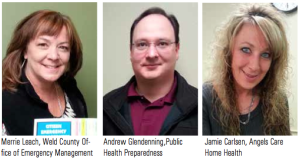Merrie Leach, Emergency Management Coordinator, Weld County Office of Emergency Management gave an insightful and vitally important presentation to the Weld County Senior Networking Group about…
What does it mean to be prepared for an emergency or disaster? Traditional preparedness training tells people to “make a plan, get a kit, be informed,” but for many seniors, these sound like daunting tasks. Instead, the Weld County Office of Emergency Management encourages people to become more resilient and prepared by doing small things, one at a time. Over time, you become more resilient and prepared.
For example, making a plan might mean reaching out to a neighbor, friend or family member who could help you evacuate; or it could include making copies of your important documents (insurance, identification and important phone numbers) and putting them in a bag by the door.
Getting a kit might start with picking up an extra food item or a bottle of water each time you go to the grocery store. High calorie, high protein foods like peanut butter or tuna are good choices and one gallon of drinkable water per person per day is recommended. On another day, you might find inexpensive flashlights or glow sticks to place in each room of your home in case of a power outage.
Finally, being informed means knowing how you will get information about an emergency situation or approaching disaster.
Get a NOAA weather radio with S.A.M.E. technology and a backup battery so you always receive weather watches and warnings.
Also be sure to sign up for emergency reverse notifications from the Weld County Communications Center at www.weld911alert.com. If you don’t have access to a computer, ask a friend or care provider for help, or call the Weld County Office of Emergency Management at (970) 304-6540 for assistance.
Like most things in life, preparedness is best taken one step at a time. Before you know it, you will be more prepared for the next emergency or disaster in Weld County.

